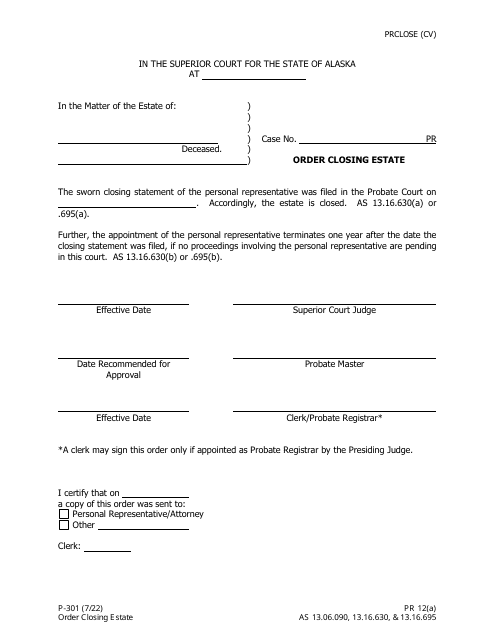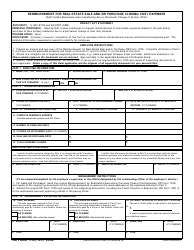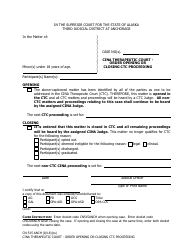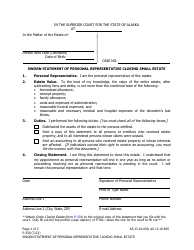Form P-301 Order Closing Estate - Alaska
What Is Form P-301?
This is a legal form that was released by the Alaska Superior Court - a government authority operating within Alaska. As of today, no separate filing guidelines for the form are provided by the issuing department.
FAQ
Q: What is Form P-301?
A: Form P-301 is a document used in Alaska to close an estate.
Q: When is Form P-301 used?
A: Form P-301 is used when all the requirements for closing an estate in Alaska have been met.
Q: What does Form P-301 do?
A: Form P-301 officially closes the estate and allows for the distribution of assets to beneficiaries.
Q: Who can file Form P-301?
A: Form P-301 can be filed by the personal representative of the estate or their attorney.
Q: Are there any fees associated with filing Form P-301?
A: Yes, there is a filing fee associated with submitting Form P-301.
Q: Do I need to provide any supporting documents with Form P-301?
A: Yes, you will need to provide various supporting documents, such as an inventory of assets and a final accounting of the estate.
Q: What happens after Form P-301 is filed?
A: After Form P-301 is filed, the court will review the documents and issue an order officially closing the estate.
Q: How long does it take for the court to process Form P-301?
A: The processing time can vary, but it typically takes a few weeks to a few months for the court to review and process Form P-301.
Q: Can I appeal the court's decision on Form P-301?
A: Yes, if you disagree with the court's decision, you may have the option to appeal.
Q: What should I do after the estate is closed with Form P-301?
A: After the estate is closed, you can proceed with distributing the assets to the beneficiaries according to the court's order.
Form Details:
- Released on July 1, 2022;
- The latest edition provided by the Alaska Superior Court;
- Easy to use and ready to print;
- Quick to customize;
- Compatible with most PDF-viewing applications;
- Fill out the form in our online filing application.
Download a fillable version of Form P-301 by clicking the link below or browse more documents and templates provided by the Alaska Superior Court.




